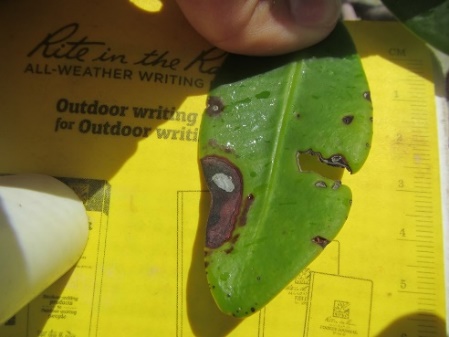Outbreak Investigation

Learning about Plant Pathogens in Mangroves
This lesson focuses on plant pathogen research in mangroves. Throughout the lesson, students will collect, process and analyze diseased leaves they collect from mangroves. They will determine what pathogens are present and explore what could cause the disease. This lesson is part of Khaled bin Sultan Living Ocean’s Foundation’s Mangrove Ecology Curriculum, which was developed for the Mangrove Education and Restoration Programs. For more information about this program, please visit Mangrove Education and Restoration.
Lesson Plans
Lesson Videos
Upload Your Class Data!

Education Standards
Ocean Literacy Principles and Fundamental Concepts (Grades 9-12)
- Principle 5.B.11: Ocean ecosystems are connected to each other in a macro food web. Over time,
organisms move from one ecosystem to another as they grow, migrate, and die. Changes in an
ecosystem or an organism may have unpredictable effects on other ecosystems. - Principle 6.D: The exponential growth of human populations, together with technical advances, have exacerbated changes in the ocean and atmosphere.
- Principle 6.E: Achieving sustainability of the diverse ecosystems and resources in the ocean depends upon collective and individual action based on scientific research and exploration.
- Principle 7.A.1: There are many opportunities for ocean exploration, which can lead to hypothesis generated science.
- Principle 7.B.5: Exploring the ocean involves global participation because there is only one ocean that connects and sustains all life.
Glossary
Agar – A gelatin-like material obtained from seaweed and used to prepare culture media on which microorganisms are grown and studied.
Bacterium – Prokaryotic microorganisms or unicellular organism in the domain Bacteria. Most bacteria are beneficial; however, some are harmful.
Citizen Science – The practice of public participation and collaboration in scientific research to increase scientific knowledge.
Culture Medium – Material (e.g., agar) used to artificially grow microorganisms.
Disease – A condition of a plant or animal that impairs normal body structure or function.
Epidemic – A disease increase in a population; usually a widespread and severe outbreak of a disease.
Fungus – A eukaryotic organism that includes unicellular microorganisms such as yeast, mold,and mushrooms. They are classified in the Kingdom Fungi.
Geographic Location – A position on Earth defined by two coordinates, longitude and latitude.
Geographic Positioning System (GPS) – A navigational system using satellite signals to fix the location of a receiver on or above the earth’s surface.
Host – An organism that supplies food, resources, and acts as a substrate for a disease.
Hypha (plural hyphae) – Branching filaments that make up the mycelium of a fungus.
Hypothesis – A tentative assumption made in order to draw out and test its logical or empirical consequences.
Microbiology – The study of microscopic organisms.
Mycelium (plural mycelia) – A network of branching hyphae.
Nematode – Roundworms that are classified in the phylum Nematoda.
Observation – An act of recognizing and noting a fact or occurrence often involving measurement with instruments.
Pathogen – Infectious agent that causes disease.
Pathology – The study of diseases.
Random Sampling – A sampling method in which samples are selected in such a way that each observation has an equal chance of selection.
Red Mangrove – A true mangrove having red wood and numerous prop roots like those in the genus Rhizophora.
Spore – Reproductive unit of fungi consisting of one or more cells.
Virus – A small infectious agent that replicates inside a living organism.
All definitions are from:
- Merriam Webster Dictionary
- NOAA
- Agrios, G.N. Plant Pathology. 5th edition.